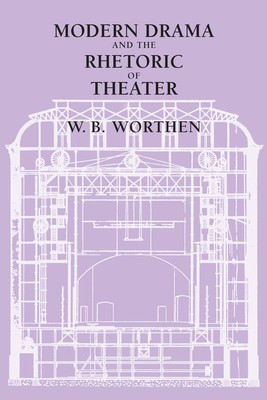
- We will send in 10–14 business days.
- Author: W B Worthen
- Publisher: University of California Press
- ISBN-10: 0520286871
- ISBN-13: 9780520286870
- Format: 15 x 22.6 x 1.8 cm, minkšti viršeliai
- Language: English
- SAVE -10% with code: EXTRA
Reviews
Description
The history of drama is typically viewed as a series of inert "styles." Tracing British and American stage drama from the 1880s onward, W. B. Worthen instead sees drama as the interplay of text, stage production, and audience.
How are audiences manipulated? What makes drama meaningful? Worthen identifies three rhetorical strategies that distinguish an O'Neill play from a Yeats, or these two from a Brecht. Where realistic theater relies on the "natural" qualities of the stage scene, poetic theater uses the poet's word, the text, to control performance. Modern political theater, by contrast, openly places the audience at the center of its rhetorical designs, and the drama of the postwar period is shown to develop a range of post-Brechtian practices that make the audience the subject of the play.
Worthen's book deserves the attention of any literary critic or serious theatergoer interested in the relationship between modern drama and the spectator.
EXTRA 10 % discount with code: EXTRA
The promotion ends in 22d.22:12:04
The discount code is valid when purchasing from 10 €. Discounts do not stack.
- Author: W B Worthen
- Publisher: University of California Press
- ISBN-10: 0520286871
- ISBN-13: 9780520286870
- Format: 15 x 22.6 x 1.8 cm, minkšti viršeliai
- Language: English English
The history of drama is typically viewed as a series of inert "styles." Tracing British and American stage drama from the 1880s onward, W. B. Worthen instead sees drama as the interplay of text, stage production, and audience.
How are audiences manipulated? What makes drama meaningful? Worthen identifies three rhetorical strategies that distinguish an O'Neill play from a Yeats, or these two from a Brecht. Where realistic theater relies on the "natural" qualities of the stage scene, poetic theater uses the poet's word, the text, to control performance. Modern political theater, by contrast, openly places the audience at the center of its rhetorical designs, and the drama of the postwar period is shown to develop a range of post-Brechtian practices that make the audience the subject of the play.
Worthen's book deserves the attention of any literary critic or serious theatergoer interested in the relationship between modern drama and the spectator.


Reviews